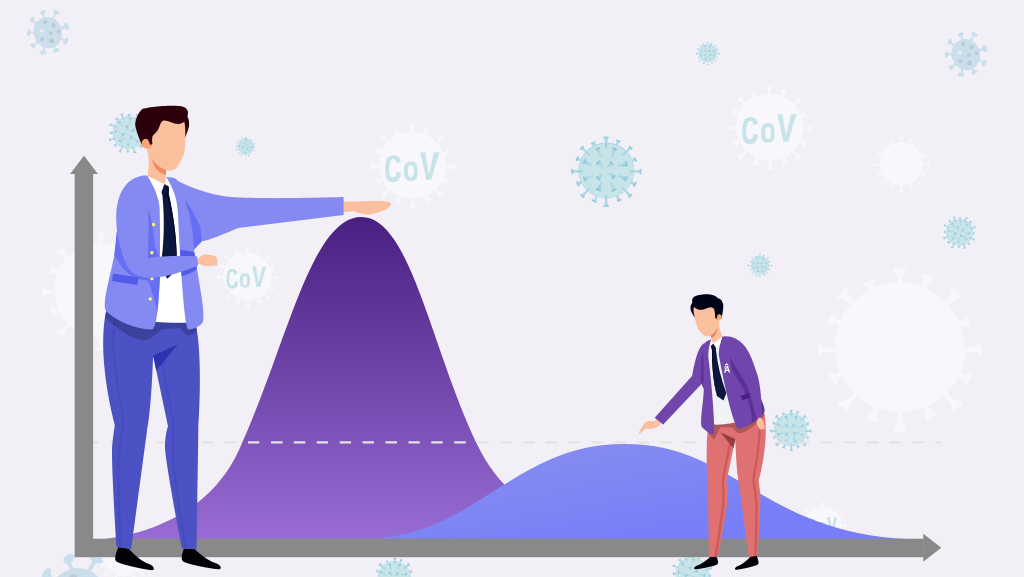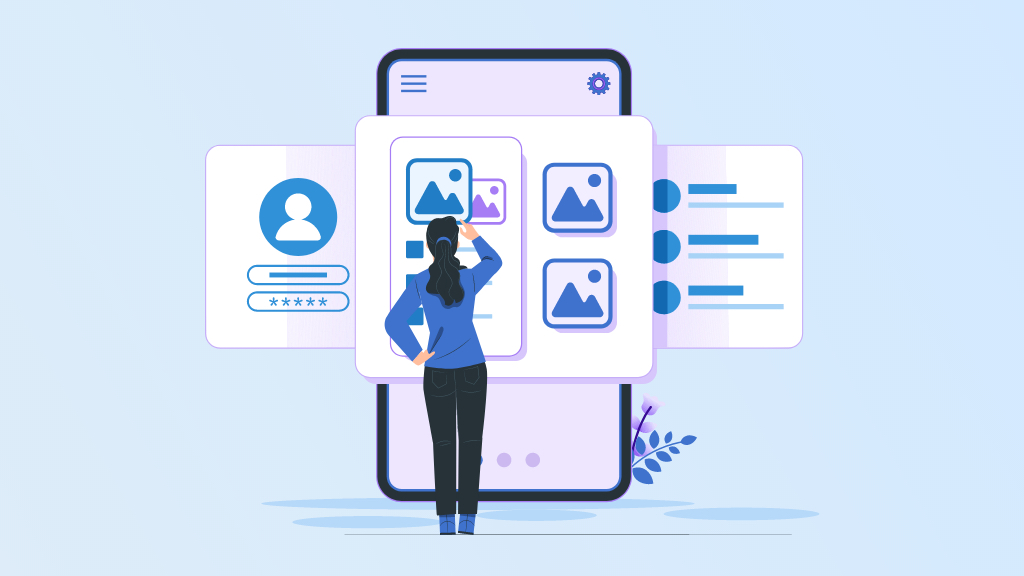Don't miss the chance to work with top 1% of developers.
Sign Up Now and Get FREE CTO-level Consultation.
Confused about your business model?
Request a FREE Business Plan.
App Development Timeline and 5 Tips to Shorten It
Table of contents

“Time is Money”
You must have heard this phrase a thousand times and it makes sense. But, have you ever thought of this phrase the other way around – Money is Time.
It is simple – If time is money then money should be time. Isn’t that right?
Well, we don’t know about the entire world’s philosophies, but, when it comes to the mobile app development world – it is true. Here, money means time, and time means money. To understand it in a better way – let’s get back to square one.
You have an outstanding app idea and you don’t want to wait for ages to see it published in the app stores in the form of a robust app. Let’s say you are eager to develop it. Now, you will need to hire a mobile app development company for the same.
And, most of them, charge for their services on an hourly basis. That means you will have to pay the cost of every hour a developer will spend while developing your mobile app. That’s how it works. The more time it takes, the more you will have to pay.
So, before getting into the world of developing an app – you must figure out your mobile app development timeline along with ways to shorten it and how much it will cost you to develop an app. While we have already answered the latter question in our previous blog, we will find all about the first one in this piece of content.
So, let’s get started.
5 Factors That Will Affect Your Mobile App Development Timeline
As you know, one size doesn’t fit all. The same concept applies when you start finding an answer to how long it will take to develop an app. The time, as well as money required to build an app, depends on a number of factors and you can not provide a single one-liner answer for all apps when it comes to estimates.
To give you an estimate of your app development timeline – let’s find out how your app idea relates to the following factors:
1. Type of Your App
If you go and find how many app categories exist – I am sure you will find plenty. There are millions of mobile apps available in the app stores and most of them offer different functionality and features.
But, to find the app development timeline, you must know in which category your app falls.
Find out do you want to develop a custom app or a clone app? Developing a custom app is not at all easy. Designing an entire business model on mobiles has its own challenges.
On the other hand, developing clone apps is a bit easier comparatively. But, then again, there are a number of categories in clone apps as well – gaming apps, education apps, utility apps, food-delivery apps, social networking apps, music apps, taxi booking apps and a lot more.
Basically, the apps that belong to categories like gaming, navigation, medicine and entertainment are more complex to develop and take more time. And, if your app belongs to simple categories like utility, news, reading – it will take less time to develop them.
To sort things out – let’s divide apps into the following categories:

Normally, it takes as less as 1-2 months to develop apps that fall in the simple category, around 4 months for developing apps that belong to the category of medium complexity, and as much as 5-7 months to develop complex apps from scratch.

2. Features & Functionality of Your App
One of the essential elements that decide app development timeline is the number of features associated with it. The more features and functionalities an application has, the more time it takes to get developed.
For instance, a feature in an application that guides the users an optimal route certainly requires more time to develop than developing a standard application that just manages content requiring minimum user experience.
If you are going to develop a simple app that doesn’t require many features – you can develop it in around 2-4 weeks. However, if your app requires the following features, the developers will take time to develop it:
- Push Notifications
- Payment
- Social Media Integration
- Authentication
- Geolocation Tracking
- Search Functionality
- Video and Audio Calls
- Integration with Wearables
The above-mentioned features require you to connect your app with other services, APIs and third-party tools. And it requires extra time and effort to understand the intricacies of these tools and services to implement them. At times, it even takes longer than expected if your developers don’t have a good understanding of these features.
For example, if you are planning to build an app like Uber that requires almost all the above-mentioned features (except video and audio calls and integration with wearables) – it will take more time than developing a simple news app.
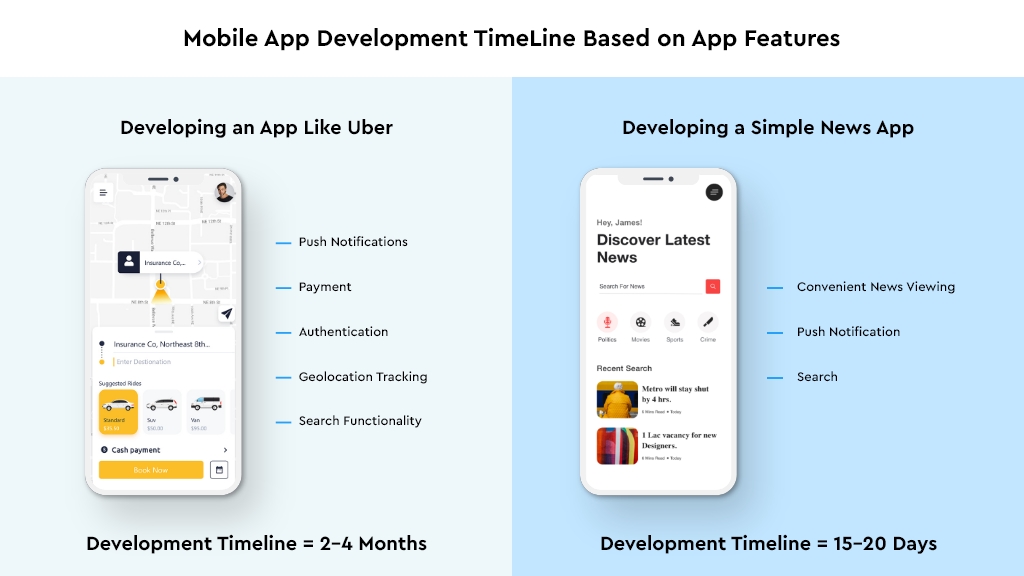
Along with these features, if your app requires the integration of emerging technologies like AR/VR, Artificial Intelligence, Chatbots or Machine Learning – it will take a lot of time to set algorithms for the same. These types of apps generally take around 4-5 months to develop.
3. Platform For Which You are Building
The question haunts many when developing an app. While it is definitely not a good idea to choose one out of these two platforms as both boast a good user base and missing out on any of them means less exposure – building for both is a bit expensive as well as time-consuming.
Developing for both platforms will require two teams – one of the iOS developers and another of Android developers – as both platforms have different requirements when it comes to programming languages, technology, and third-party tools.
Normally, the development time for iOS is shorter as Android runs on a lot more variety of devices and needs extensive optimization efforts. In a nutshell, for an Android application, you’ll require around 20-30% additional time than for an iOS application.
4. The Clarity Of Your App’s Idea
Every successful app was once an idea. But, before working on developing your idea or finding an appropriate app development timeline, you must ensure that it converts into a clear solution that is helpful for your users.
Who will get benefits from it? For what reason would someone use this? How will this application make life simpler for the users? What problems will it solve? If your answers are in all random directions, it will be hard to find a purpose for your app and it will take you a long time to develop it.
For example, if you are developing a taxi app – social media integration is a good feature to add in it to help your users register with a single tap. But, embedding in it news feeds for your users so that they can share their riding experience with their friends is going to be a useless feature that will make your app cluttered.
Such features are not just unnecessary but will also ruin your app’s purpose. And, if your purpose isn’t well clear before you start the development, you’ll transform what was once an amazing app into something that is just a mess now.
Not only will it take you years to develop it, but it will also waste a lot of your money. So, while developing an app stick to one purpose and save your money as well as time.

5. Who Is Developing it?
Developing a mobile app is not as easy as a walk in the park. A single person alone cannot do that. If you wish to develop a successful app – you will require a team of developers having specialization in different areas.
Now, to get that team – you have the following options:
- Employ an in-house team of developers
- Hire freelancers who will work together for you remotely
- Outsource services of an app development agency
While you may think that hiring freelancers is an extremely alluring option and a ton of businesses follow this path. But, according to statistics, 80% of organizations face issues while dealing with freelancers, such as unavailability, late response time, language barriers, and at times even the quality.
These issues, in turn, delay the deliveries of projects and you may never be able to launch your app as per the specified timings. On the other hand, establishing an in-house team of developers can be a bit expensive if you are just entering the mobile world – but, it will definitely expedite your app development and launch process.
The third option, which is hiring an app development agency is neither expensive nor a cheap idea. Also, you will have decent quality and timely delivery of your project if you hire a reliable team of app developers. Thus, it is best to outsource your project as this way you can develop an app that meets your objectives and your timelines.
Now that we know all the factors that impact the mobile app development timeline – let’s see the mobile app development process that developers follow and how it impacts the answer to the question “How Long does it take to develop an app.”
Mobile App Development Process, Stages and Timeline
Mobile application development requires a lot of research, critical thinking and market analysis before the development starts. Despite the development method you use, the basic phases of developing an app and time taken by each one of them will include:
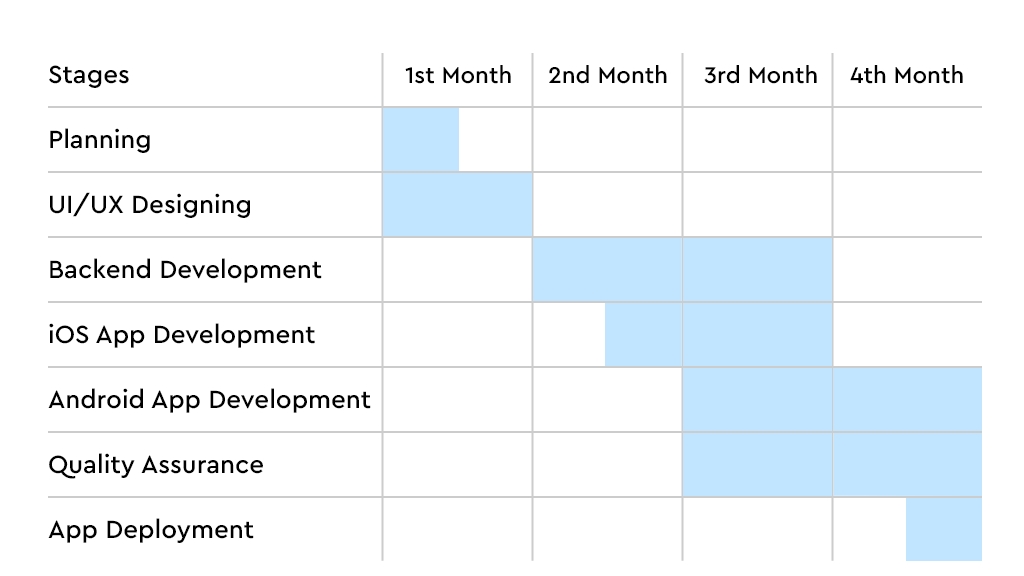
Step 1: Planning
This stage consists of planning around the business model your app will use. In this stage, you will decide everything related to your app – from its feature set to revenue model, competitor analysis to tech stack and best practices that can save your time and money in development.
Here you have to have a strong understanding of your market and your prospective users. This stage is also called idea validation of an app and it can take up to 15-20 days if you are doing it with the help of experts.
Want to know how to validate an app idea? Check out our comprehensive blog on Idea Validation and Its Process to generate a viable business plan. Get to the Blog Now!
Step 2:UI/UX Designing
Amazing UI + Seamless UX = Successful App.
This is the ultimate mantra for developing a successful mobile app. However, following it doesn’t come easy. It includes a lot of planning, structuring, designing and after all testing to come out with an application that is flawlessly easy to use.
And all this never happens in a blink of an eye. Great things take time.
For all this, your designer will have to work on creating user personas, structure the task list and UI wireframe, make mockups and break down the feedback into sprints to rework on them. This step may take around one to two months for an application and only after it gets complete – you can move to the development step where the actual magic happens.
Step 3: Backend Development
Back-end development, as the name says, is about the deep logics used behind an application, the data storing and handling mechanisms, performance and much more. Basically, it includes the following tasks:
- Server-Side Logics: For defining the functions handled by the app server.
- Data Storage Setup: It includes the design of databases that are serving the application.
- Push Notifications: The functionality that allows the server to send push messages to the UI.
- Data Integration: For empowering data exchange between various resources including the third-party ones.
- User Management: It defines the methods of user authentication, profiles management, and security policies.
- Versioning: The mechanism permitting back-end developers to work on the next part of the app without breaking the previous one.
By the end of this phase, you will have a complete backend architecture for serving your app’s functionality. The backend development is one of the most complex parts of developing an app and it requires around 2-3 months depending on the app functionality and architecture.
Once backend developers understand the architecture and working of an app – you can start working on frontend development simultaneously.
Step 4: Android and iOS Development
At this stage, you will have a working prototype of your application to check the user experience and get the user’s feedback on how it works. But, for this, your developers will have to write the front-end code.
On average this step takes around 3 months – that means most of the development time goes in this step. The front-end developers follow the architecture created by UI designers and backend developers which is basically the foundation supporting the interface. So, communication between the two teams during the development stage is of utmost importance to avoid bugs and re-work later on.
Step 5: Testing
To ensure the quality of your app, the testing stage should include various types of tests: unit testing, functional testing, integration testing and bug fixing. If you have done the proper alpha testing of your app then your beta testing round shouldn’t take more than 2 weeks. After the testing, the application is launched.
Planning to Build a Mobile App? Never compromise with its quality! Check out Mobile App Testing Checklist by Apptunix to ensure you launch a quality product.
Step 6: Deployment
If everything is done well in the past stages, the app deployment should not take long. Simply distribute your app on App Store and Google Play Store – and you are done. Your users will do the rest by downloading your application on their cell phones. But, later on, do not forget to pay heeds to the user’s feedback and continue updating it using the same.
Now that you know the entire mobile app development process and how much time you will have to invest in each stage of developing an app – it is time to hit the ground running.
But, wait. Do you want to lessen the development time and launch your app ASAP? Well, there are some options that you can try to speed up the development process and guess what – they are cost-effective too. So, let’s explore all of them.
5 Tips to Shorten Your Mobile App Development Timeline
As seen in the above sections, the average time to develop an app is around 3-4 months. But, because of the increased usage of smartphones around the globe, every second is important for business owners to not miss any chance or opportunity to grow their business.
So, if you are one of those enthusiastic entrepreneurs, who wish to launch their mobile app ASAP to not miss any existing or prospective customers – there are some solutions for you using which you can launch your app in less than just one month. Let’s find what these options are:
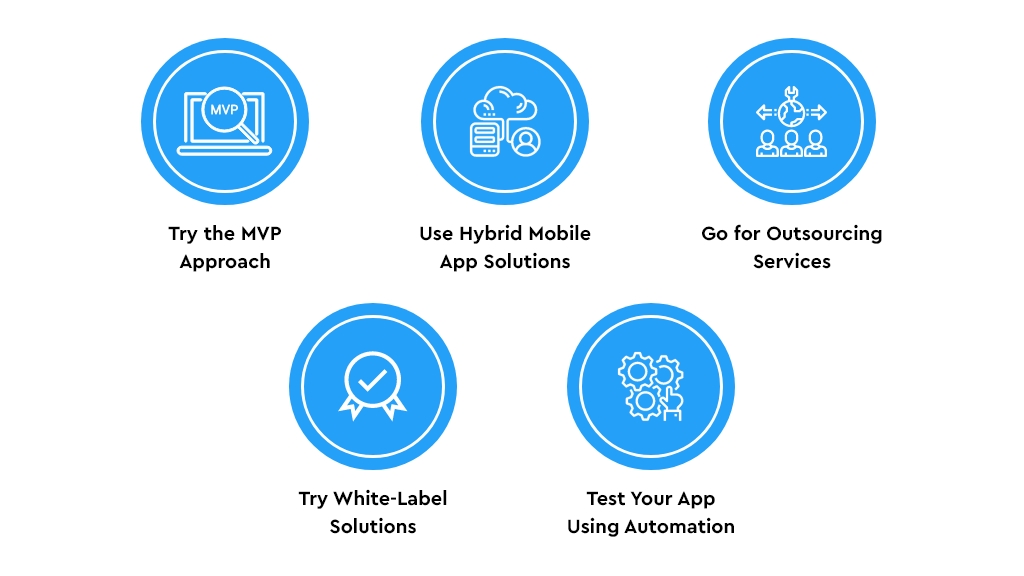
1. Try the MVP Approach
MVPs are a great way to save time. They can be developed easily by focusing on the basic functionality of the app. Once the MVP is out in the market, you can build the final app depending on the user’s feedback and additional features. A number of big brands like Airbnb, Uber, and Snapchat launched MVPs before the actual apps.
2. Use Hybrid Mobile App Solutions
Cross-Platform App Development Technology lets you use a single codebase to target multiple platforms, as opposed to writing native code for every platform independently. You code once and you get an app that you can publish on Android as well as iOS.
But there are some drawbacks that accompany hybrid apps. They handle animations with less fluidity and you can’t integrate high-end technologies like AR, VR in your cross-platform apps.
And that’s why a number of startups have used them to rapidly get into the market, and then they replace them with native applications to provide a more feasible solution.
3. Go for Outsourcing Services
This option will save you time as well as efforts. Having an excellent outsourcing app development company by your side at the time of development is more efficient than building an in-house team of developers.
The option becomes even more amazing if you are planning to do add-ons to your products or need to launch a different version of your app for the other platform.
For example, if you have iOS developers in-house and your iOS app is ready to launch and now you want to build for the Android version, instead of forcing your team to spend time on learning a new tech stack, you can just ask for outsourcing.
4. Try White-Label Solutions
These solutions are the products created by one organization and afterward are rebranded for the use of another company. This will help save you a lot of development time since you will not have to develop anything from scratch.
At Apptunix, we provide 100% customizable and white-label solutions for businesses around the globe and that too at decent prices.
5. Test Your App Using Automation
This saves the time you will be spending on testing your app manually. Using automation testing, you can together run a set-up of tests that would otherwise take hours to complete manually. But, this is not always the recommended solution for every type of app. So, be careful and remember that your app’s quality should be always your first priority.
So, that was it. Depending on your app’s type, functionality and business objectives – you can select any of the above-mentioned tips to reduce your app development time.
Wrapping Up
When building up a mobile application, alongside an assessment of prerequisites in terms of the features, platforms and purpose of the application – one of the numerous things to consider is the TIME you will have to invest to create it. This blog was our take on the same. If you have more questions on how you can shorten your app development timeline – feel free to contact us!
Our app development experts can help you with accomplishing your business objective at the ideal time and with the least hiccups.

Rate this article!
(11 ratings, average: 4.64 out of 5)
Join 60,000+ Subscribers
Get the weekly updates on the newest brand stories, business models and technology right in your inbox.

Humane yet subtle, Naiya is a girl full of ideas about almost everything. After earning a bachelor’s degree in computer science and engineering, she decided to merge her technical knowledge with her passion for writing – to accomplish something interesting with the fusion. Her write-ups are usually based on technology, mobile apps, and mobile development platforms to help people utilize the mobile world in an efficient way. Besides writing, you can find her making dance videos on Bollywood songs in a corner.

App Monetization Strategies: How to Make Money From an App?
Your app can draw revenue in many ways. All you need to figure out is suitable strategies that best fit your content, your audience, and your needs. This eGuide will put light on the same.
Download Now!Subscribe to Unlock
Exclusive Business
Insights!
And we will send you a FREE eBook on Mastering Business Intelligence.
